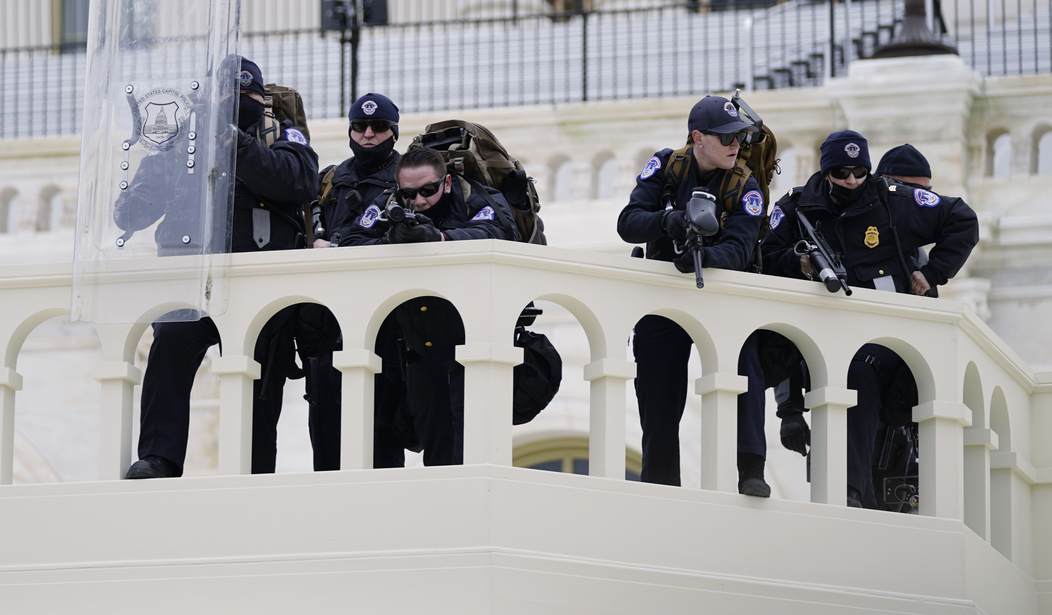We discussed this on the Triggered Podcast yesterday. The US Capitol Police is expanding beyond the District of Columbia. They’re going to open offices in Florida and California. As the saying goes, never let a crisis go to waste, especially if it means expanding government police powers. Sorry, but why can’t local law enforcement handle threats against members of Congress. Why can’t the FBI or the numerous other federal law enforcement agencies that already do this (via CBS News):
The U.S. Capitol Police announced this week that they plan to open regional field offices in California and Florida as part of an ongoing effort to better investigate threats against members of Congress.
Threats have surged in recent years against U.S. lawmakers, a group the Capitol Police are charged with protecting, and the Capitol Police Inspector General has repeatedly recommended the agency transform its posture to be more proactive.
A spokesperson for the Capitol Police said the field offices were part the department's ongoing efforts to operate more like a protective agency, such as the Secret Service, rather than a traditional, reactive police department.
The spokesperson said the first field offices will be located in the Tampa and San Francisco areas, and that more locations are planned in the future. "At this time, Florida and California are where the majority of our threats are originate from," the spokesperson said.
The department said it planned to work closely with the U.S. Attorney's offices in those locations to take a "regional approach" to investigating and prosecuting threats against members of Congress.
Was there a need to reform the training and tactics of the Capitol Police post-January 6? Sure—but there is one thing that’s missing from this move which is that you cannot FOIA the US Capitol Police. So, we have a quasi-secret police force coming to a neighborhood near you, huh? Roll Call had a good piece about this agency that’s “shrouded in secrecy,” and how it’s interesting to see members of Congress call for more law enforcement transparency post-George Floyd but avoid that topic of discussion when talking about the Capitol Police:
Recommended
Democrats and Republicans in Congress have called for an overhaul of law enforcement practices following the police killing of George Floyd, but those same lawmakers who want accountability and transparency nationwide aren’t taking a stance on whether their own department, the Capitol Police, should be subject to the Freedom of Information Act. As a part of the legislative branch, the department remains exempt from the law.
[…]
This reality leaves documents as fundamental as inspector general reports shielded from the public. On May 19, when CQ Roll Call asked, through FOIA, for annual Capitol Police inspector general reports dating back to 2015, James W. Joyce, a senior counsel for the department, said they need not complete the document request.
Joyce wrote in response to the email request: “please be advised that the United States Capitol Police, as a legislative branch entity, is not an ‘agency’ as defined by 5 U.S.C. §§ 551 et seq., under the Freedom of Information Act. Therefore, the USCP is not subject to the requirements of the Freedom of Information Act.”
A House Administration Committee aide, when asked for a Capitol Police IG report, said he was told those reports are “law enforcement sensitive” and “not a matter of public record.”
[…]
The Capitol Police, which gets its funding from taxpayer money, is able to make arrests outside of the Capitol complex, including around Union Station. Jonathan M. Smith, executive director of the Washington Lawyers’ Committee for Civil Rights and Urban Affairs, said Congress needs to address the opaqueness of the force.
“They operate not only on the Capitol grounds but they have a cooperation agreement with the city that permits them to make arrests off the Capitol grounds,” Smith said. “For them to be an agency operating in the District without the same kind of transparency that the District government has is really not a good thing, and Congress should address it and fix it.”
And now, they’re in two states. Given how law enforcement and our intelligence apparatus have operated over the past four years, I’m not one to give them a pass here. There are trust issues, especially since there are zero accountability measures with Capitol Police. Is this the initial stages of a national de facto secret police force? How else would you describe the Capitol Police given these attributes?

























Join the conversation as a VIP Member